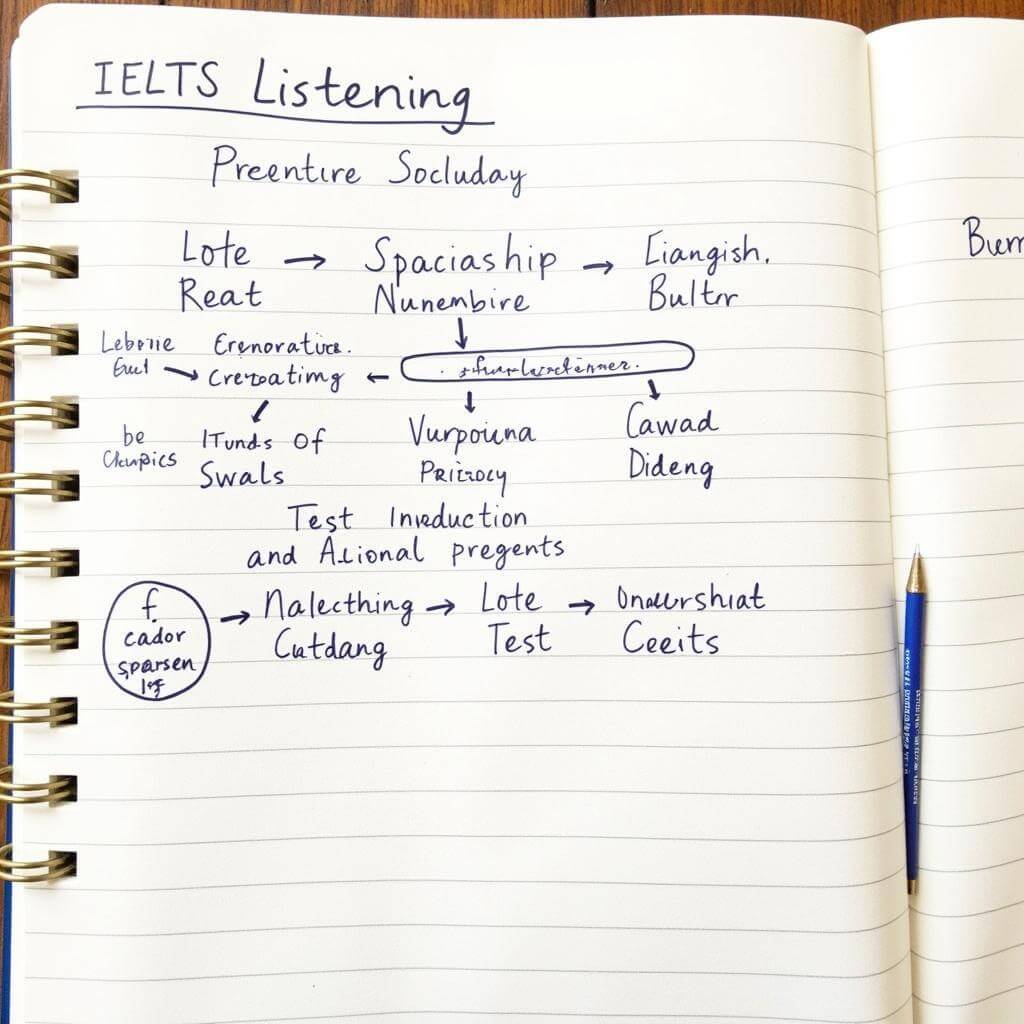Effective note-taking while listening is a crucial skill for IELTS test-takers, especially in the Listening section. This ability not only helps you capture essential information but also enhances your overall comprehension and recall. As an experienced IELTS instructor, I’ll share valuable insights on practicing note-taking while listening to boost your performance in the exam.
Understanding the Importance of Note-Taking in IELTS Listening
Note-taking is an indispensable technique for IELTS Listening success. It allows you to:
- Focus on key information
- Organize thoughts quickly
- Recall details accurately
- Manage time efficiently
- Reduce stress during the test
How to practice IELTS listening under time pressure is closely related to effective note-taking, as both skills work hand in hand to improve your performance.
Key Strategies for Effective Note-Taking
1. Develop a Personal Shorthand System
Create your own abbreviations and symbols for common words and concepts. For example:
- & for “and”
- w/ for “with”
- b/c for “because”
- → for “leads to” or “results in”
- ↑ for “increase” or “rise”
- ↓ for “decrease” or “fall”
2. Focus on Keywords and Main Ideas
Train yourself to identify and jot down essential information quickly. This includes:
- Names
- Dates
- Numbers
- Locations
- Key terms related to the topic
Identifying key transitions efficiently can significantly enhance your note-taking abilities by helping you recognize important shifts in the conversation or lecture.
3. Use a Clear Structure
Organize your notes in a logical manner:
- Use bullet points or numbered lists
- Leave spaces between main ideas
- Indent sub-points under main ideas
- Use arrows or lines to show relationships between concepts

4. Practice Active Listening
Engage with the audio material by:
- Predicting possible questions or topics
- Mentally summarizing main points
- Identifying patterns or themes in the information
5. Develop Speed and Accuracy
Improve your note-taking speed and accuracy through regular practice:
- Use IELTS practice tests and materials
- Listen to podcasts or news broadcasts
- Attend lectures or presentations and take notes
Improving listening with podcasts can be an excellent way to enhance your note-taking skills in a more relaxed environment.
Applying Note-Taking Skills to IELTS Listening Tasks
Different IELTS Listening tasks require specific note-taking approaches:
1. Multiple Choice Questions
- Underline keywords in the questions
- Note possible answers as you listen
- Cross out eliminated options
2. Form/Table Completion
- Quickly scan the form or table before listening
- Note down exact words or numbers you hear
- Pay attention to spelling of proper nouns
3. Sentence Completion
- Identify the type of word required (noun, verb, etc.)
- Write down multiple options if unsure
- Check grammar consistency with the given sentence
4. Short Answer Questions
- Focus on wh- questions (who, what, where, when, why, how)
- Note down specific details related to these questions
- Write concise answers using keywords from the audio
Common Mistakes to Avoid in Note-Taking
- Writing full sentences instead of key points
- Focusing too much on details and missing main ideas
- Using an inconsistent or confusing shorthand system
- Neglecting to review and organize notes after listening
- Trying to write down everything instead of being selective
Practice Techniques for Improving Note-Taking Skills
- Timed note-taking exercises: Set a timer and practice taking notes from short audio clips
- Peer review: Exchange notes with a study partner and compare effectiveness
- Transcription practice: Listen to short segments and try to transcribe them completely, then compare with the actual transcript
- Mind mapping: Create visual representations of the information you hear
- Progressive practice: Start with slower, clearer audio and gradually increase difficulty
Handling listening with minimal preparation can be improved through consistent practice of these techniques, making you more adept at quick and efficient note-taking.
Conclusion
Mastering the art of note-taking while listening is a game-changer for IELTS success. By implementing these strategies and practicing regularly, you’ll significantly enhance your performance in the Listening section. Remember, effective note-taking is a skill that not only benefits you in the IELTS exam but also in your academic and professional life. Keep refining your technique, and you’ll see improvement in your listening comprehension and overall test scores.
How to practice IELTS listening while commuting offers additional opportunities to hone your note-taking skills in various environments, further preparing you for the challenges of the IELTS Listening test. Stay committed to your practice, and you’ll approach the IELTS with confidence and competence.